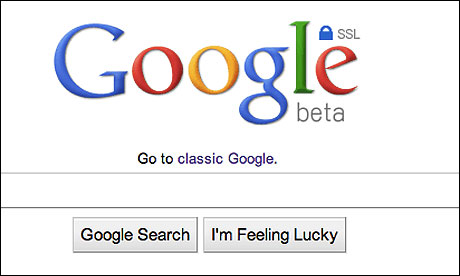
The encrypted Google beta site ... no, it won't work for porn
Google has enabled encrypted searching using SSL (Secure Sockets Layer) which it says will prevent "employers and internet service providers" from reading what is sent.
The possibility that employers and ISPs might be watching peoples' search traffic clearly concerns Google, and it has often concerned employees.
Although companies won't be able to see what staff are searching for, it will not give them a passport to view pornography without being monitored, because any connection made via Google to non-secured sites will be visible in the same way as before.
The idea may be to allow dissidents and people who are fearful of their employer's policies or their ISP's monitoring to carry out searches in confidence.
Update: people have pointed out that connections to the site can be blocked by its URL - but at least you'd know that that was happening and you might be monitored.
Google's official blog carries no mention of the reasoning behind the addition, although in an accompanying explanation, the company says this is so:
you can have an end-to-end encrypted search solution between your computer and Google. This secured channel helps protect your search terms and your search results pages from being intercepted by a third party. This provides you with a more secure and private search experience.
Other Google offerings such as Google Images and Maps aren't available on SSL at the moment, so you don't have a private search experience on those.
One interesting wrinkle is that if you click on a link from an encrypted page, the referrer data isn't passed on to the receiving site (unless that also uses HTTPS) – which might mean that some sites aren't going to be able to work out where traffic is coming from. This seems a bit contrary on Google's part, since it's hiding its role in directing traffic. (The expectation is almost certainly that the vast majority of people won't want or need this, so the effect on Google's visibility to "downstream" sites will be minimal.)
The connection might also be slower because of the time involved in setting up the SSL link.
Google defaulted to SSL for its Gmail webmail offering in January 2010– a move that makes far more sense and arguably was long overdue.
The dangers of connecting to webmail over unsecured links – especially via smartphones – is precisely what Guardian Technology showed in April: the danger is that "sniffers" can capture the passwords and usernames being sent in the clear. And a similar risk exists if you're using a desktop or laptop and a wireless connection, or a compromised setup.
Update: Google in fact introduced this feature in June 2010, but now seems to be actively pushing the service: if you go to Google's home page, there's a non-zero chance you'll be presented with the encrypted page even though you didn't directly request it. Clever way to push a product
Comments